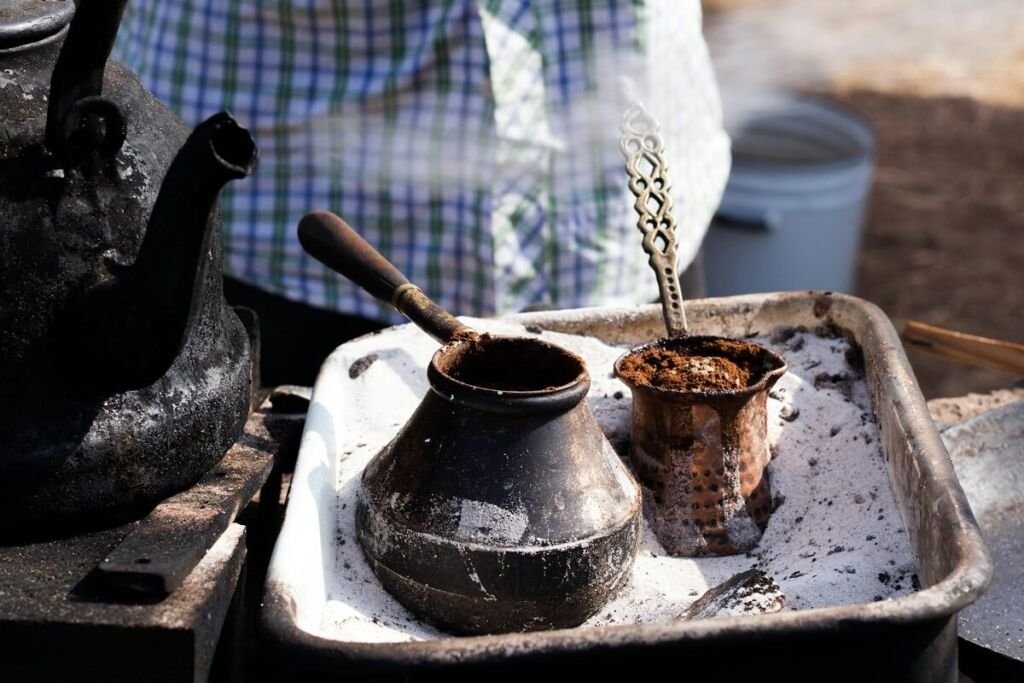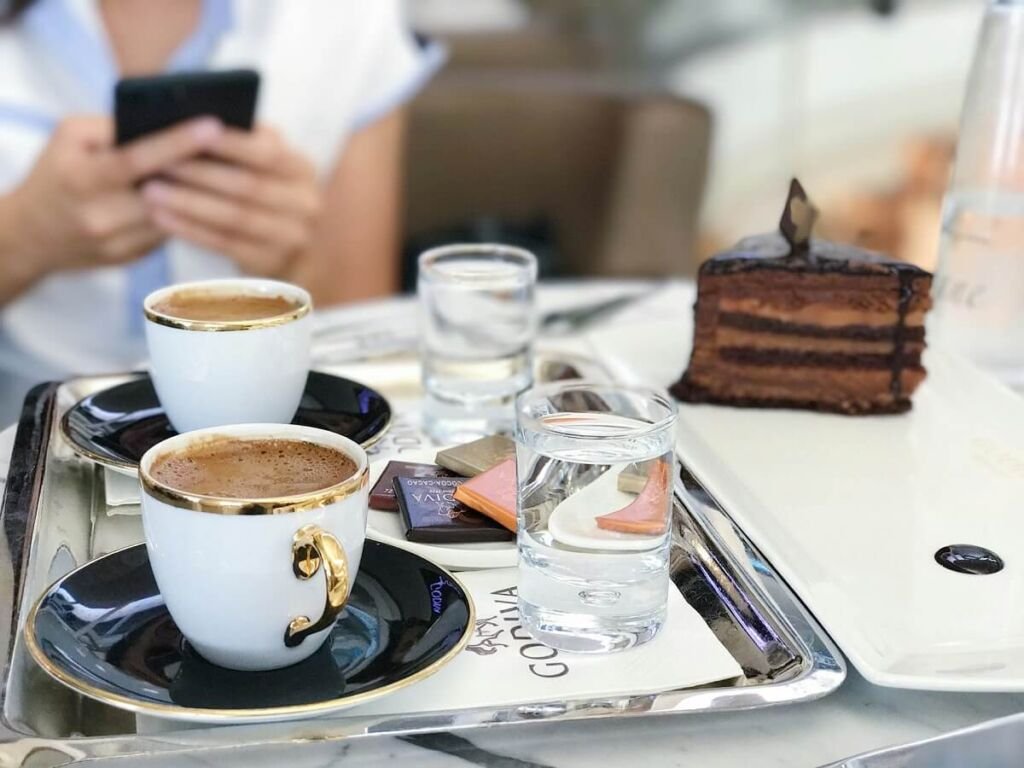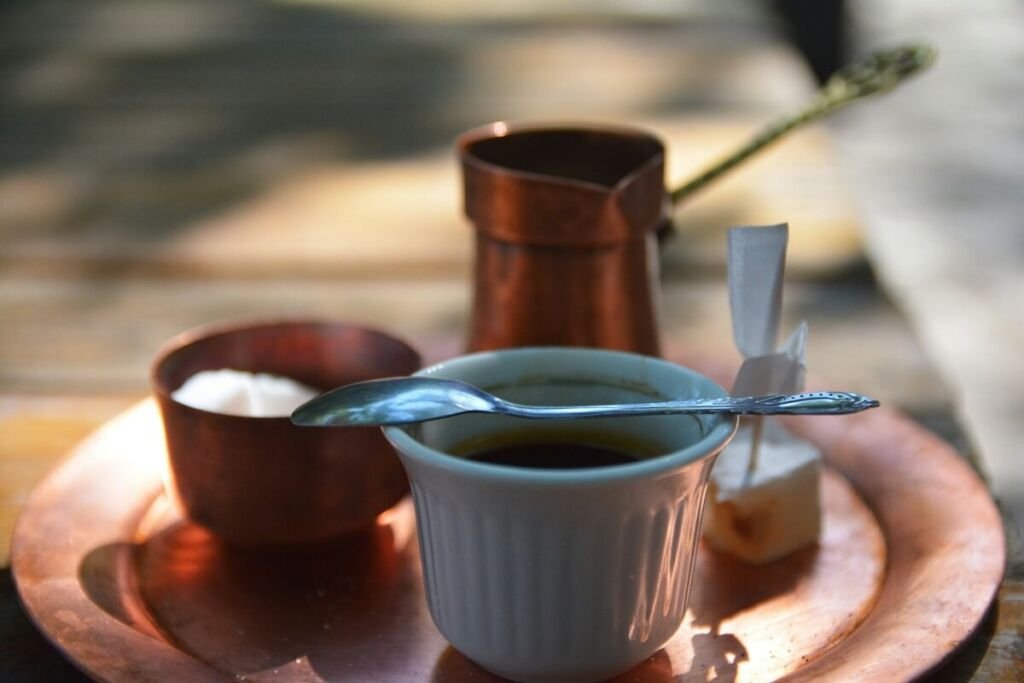Turkish Coffee (Türk kahvesi): A Rich Tradition in Every Sip
Table of Contents
ToggleTurkish coffee, known as Türk kahvesi, is more than just a beverage—it’s an integral part of Turkey’s rich cultural heritage.
Renowned for its unique brewing method, strong flavor, and social significance, Turkish coffee has been enjoyed for centuries.
It is so deeply rooted in Turkish culture that it has been recognized as an Intangible Cultural Heritage of Humanity by UNESCO.
Let’s explore the history, preparation, and cultural importance of Turkish coffee, along with tips on how to enjoy it to the fullest.
1. A Brief History of Turkish Coffee
The tradition of Turkish coffee dates back to the Ottoman Empire in the 16th century. Introduced to Istanbul from Yemen, coffee quickly became a symbol of sophistication and hospitality.
It was served in royal palaces and coffee houses, which became popular centers for social interaction, intellectual discussions, and artistic performances.
Today, Turkish coffee continues to hold a special place in Turkey’s culinary and cultural traditions, symbolizing friendship, respect, and celebration.
2. What Makes Turkish Coffee Unique?
Turkish coffee stands out from other coffee styles due to its preparation and presentation:
- Finely Ground Coffee: Turkish coffee is made with the finest ground coffee beans, almost powder-like in texture.
- No Filtering: The grounds are not filtered out, creating a thick, strong brew.
- Special Pot: It is brewed in a small pot called a cezve, traditionally made of copper or brass.
- Rich Foam: The foam on top is an essential aspect of Turkish coffee, indicating its quality.
- Slow Brewing: The coffee is brewed slowly over low heat, enhancing its flavor and aroma.
3. How to Make Turkish Coffee
Making Turkish coffee is an art form that requires attention to detail.
Here’s a step-by-step guide:
Ingredients
- 1 heaped teaspoon of finely ground Turkish coffee
- 1 cup of cold water (use the demitasse cup for measurement)
- Sugar (optional: no sugar, medium, or sweet)
Instructions
- Measure Water: Pour one cup of cold water into the cezve.
- Add Coffee and Sugar: Add one teaspoon of Turkish coffee per cup and sugar to taste. Do not stir immediately.
- Mix and Heat: Stir the mixture until combined, then place the cezve on low heat.
- Create Foam: As the coffee heats, foam will form on top. Before it boils, spoon some foam into the serving cup.
- Boil and Pour: Let the coffee come to a gentle boil, then pour it slowly into the cup, preserving the foam.
- Serve Immediately: Turkish coffee is best enjoyed fresh and hot.
4. How to Serve Turkish Coffee
Turkish coffee is traditionally served in small porcelain cups, known as fincan, along with a glass of water and often a sweet treat like lokum (Turkish delight) or chocolate.
The Ritual
- Water: The water cleanses the palate before drinking the coffee.
- Sweet Treat: Enhances the coffee-drinking experience.
- No Stirring: Do not stir the coffee after it’s served to avoid disturbing the grounds at the bottom.
5. Cultural Significance of Turkish Coffee
Turkish coffee is deeply woven into social and cultural traditions:
Symbol of Hospitality
Serving Turkish coffee is a gesture of hospitality. Offering a guest a cup of Turkish coffee is a way to show respect and welcome them warmly.
Engagement Rituals
In Turkish engagement ceremonies, the bride-to-be serves coffee to the groom’s family. A playful tradition involves adding salt instead of sugar to the groom’s coffee to test his patience and sense of humor.
Coffee Reading
Fortune-telling with coffee grounds, or fal, is a popular activity in Turkey.
After drinking the coffee, the cup is turned upside down, and the patterns left by the grounds are interpreted for fun or guidance.
6. Health Benefits of Turkish Coffee
Turkish coffee, when consumed in moderation, offers several health benefits:
- Rich in Antioxidants: Helps combat oxidative stress.
- Boosts Energy: High caffeine content provides an energy boost.
- Supports Mental Alertness: Improves focus and concentration.
- May Improve Digestion: Drinking it after a meal can aid digestion.
7. Where to Try Turkish Coffee
Cafes in Turkey
For an authentic experience, visit traditional Turkish coffee houses, known as kahvehane, or modern cafes that blend tradition with innovation.
Famous Spots
- Mandabatmaz (Istanbul): Famous for its thick, foamy coffee.
- Kurukahveci Mehmet Efendi (Istanbul): A historic brand known for its premium Turkish coffee.
8. Tips for Enjoying Turkish Coffee
- Drink Slowly: Sip Turkish coffee slowly to savor its rich, bold flavor.
- Don’t Drink the Grounds: Stop drinking when you reach the grounds at the bottom of the cup.
- Pair with Sweets: Enhance your experience with lokum, baklava, or other Turkish desserts.
Turkish coffee is more than a drink; it’s a timeless tradition representing connection, culture, and the art of savoring life’s moments. From its rich history to its intricate preparation and cultural rituals, Turkish coffee offers an experience beyond taste.
Whether in Turkey or enjoying it at home, a cup of Turkish coffee is a journey into one of the world’s most cherished culinary traditions.
What is Turkish coffee, and how is it different from regular coffee?
Turkish coffee is a traditional brewing method where finely ground coffee is simmered in a special pot called a cezve. It differs from regular coffee by being unfiltered, resulting in a strong, thick brew with grounds at the bottom of the cup.
How do you prepare authentic Turkish coffee?
To make authentic Turkish coffee, mix finely ground coffee, cold water, and optional sugar in a cezve. Heat slowly until foam forms, then pour into a small cup, preserving the foam.
Why is Turkish coffee served with water and sweets?
Water cleanses the palate before drinking, enhancing the flavor of the coffee. Sweets like Turkish delight complement the coffee’s strong, bold taste.
Can Turkish coffee be part of a healthy diet?
Yes, Turkish coffee contains antioxidants, boosts energy, and supports mental alertness. Drinking it in moderation can contribute to a healthy diet.
What is the significance of Turkish coffee in Turkish culture?
Turkish coffee symbolizes hospitality, respect, and social bonding. It plays a role in traditions like engagement ceremonies and coffee-ground fortune-telling.





